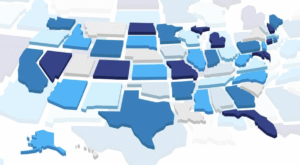Across the United States, evolving data collection and processing practices are driving digital services and socially beneficial research, but also pose increasing risks to individuals and communities that America’s existing sectoral privacy frameworks are insufficient to govern. In response, leaders in law and policy are considering more comprehensive approaches to privacy regulation, which establish baseline rights and protections for personal data throughout the economy. Years of negotiations in Congress culminated in the introduction of the bipartisan American Data Privacy and Protection Act in 2022; however, its fate remains uncertain. In the absence of federal legislation, five U.S. states—California, Virginia, Colorado, Utah, and Connecticut— enacted comprehensive consumer privacy laws between 2018-2022.
The Future of Privacy Forum provides expert, independent analysis of legislative and regulatory approaches to protecting data privacy interests. FPF does not typically support or oppose particular bills, but instead focuses on analyzing proposals in relation to existing privacy frameworks, sharing information on current data practices and technologies, and ensuring that data governance strategies are future-looking and adaptable.
FPF also engages with the broader privacy community through reports, blog posts, webinars, and educational programs such as the CPRA Law + Tech Series. It is our view that robust and durable policy outcomes can be achieved when all stakeholders are equipped to understand the key technologies, business practices, and legal mechanisms available to regulate privacy and data protection. FPF’s legislation work is led by Tatiana Rice, Senior Director.
Featured
A New Domicile for Comprehensive Privacy in Delaware
On June 30, 2023, in the final hours of the Delaware legislative session, lawmakers in Dover passed House Bill 154, the Delaware Personal Data Privacy Act (“DPDPA”). If enacted by Governor Carey, the DPDPA will take effect on January 1, 2025 and follows the general model established by the Connecticut Data Privacy Act (CTDPA), with […]
Effective Dates of New State Privacy Laws
A significant new chapter for data privacy protections in the United States will commence on July 1, 2023 as broad-based consumer privacy laws in Colorado and Connecticut take effect.
FPF Files Comments with the U.S. Department of Health and Human Services (HHS) Office for Civil Rights
On June 15, the Future of Privacy Forum (FPF) filed comments with the U.S. Department of Health and Human Services (HHS) Office for Civil Rights (OCR) regarding the Notice of Proposed Rulemaking (NPRM) on extending additional protections to reproductive health care data under the Health Insurance Portability and Accountability Act (HIPAA). One year ago last […]
We’re On to Oregon: Sixth State Privacy Law of 2023 Creates New Consumer Rights and Protections
On June 22nd, lawmakers in Salem passed SB 619, the Oregon Consumer Privacy Act (“OCPA”). If enacted by Governor Kotek, Oregon will become the eleventh U.S. state (and sixth in 2023) to adopt broad-based data privacy legislation governing the collection, use, and transfer of consumer data. The bulk of OCPA’s requirements will take effect on […]
(Health) Data is What (Health) Data Does in Nevada
Note: This title is inspired by Professor Daniel J. Solove’s recent essay, ‘Data Is What Data Does: Regulating Based on Harm and Risk Instead of Sensitive Data.’ On June 16, 2023, Nevada Senate Bill 370 (SB 370) was signed into law by Governor Lombardo, making Nevada the second state, after Washington, to pass broad-based consumer […]
FPF Releases Report on Verifiable Parental Consent
Today, FPF released a new report on the effectiveness of a key federal children’s privacy requirement known as verifiable parental consent (VPC). The Children’s Online Privacy and Protection Act (COPPA) requires operators of child-directed services to provide parents with detailed, direct notice and obtain parents’ affirmative express consent – verifiable parental consent – before collecting […]
Connecticut Shows You Can Have It All
On June 3rd, Connecticut Senate Bill 3 (SB 3), an “Act Concerning Online Privacy, Data and Safety Protections,” cleared the state legislature following unanimous votes in the House and Senate. If enacted by Governor Lamont, SB 3 will amend the Connecticut Data Privacy Act (CTDPA) to create new rights and protections for consumer health data […]
FPF Submits Comments in Response to the Consumer Financial Protection Bureau’s Request for Information on Data Brokers
On June 5, the Future of Privacy Forum filed comments with the Consumer Financial Protection Bureau (CFPB) in response to their Request for Information (RFI) Regarding Data Brokers and Other Business Practices Involving the Collection and Sale of Consumer Information. In 2021, FPF explored the landscape of the current data broker industry in testimony presented […]
The Right to be Let a Lone Star State: Texas Passes Comprehensive Privacy Bill
Over Memorial Day weekend Texas lawmakers passed the Texas Data Privacy and Security Act (TDPSA) with unanimous votes in both the State House and Senate. If enacted by Governor Abbott, Texas will become the tenth U.S. state (and fifth in 2023) to enact broad-based data privacy legislation governing the collection, use, and transfer of consumer […]
Shining a Light on the Florida Digital Bill of Rights
On May 4, 2023, the Florida ‘Digital Bill of Rights’ (SB 262) cleared the state legislature and now heads to the desk of the Governor for signature. SB 262 bears many similarities to the Washington Privacy Act and its progeny (specifically the Texas Data Privacy and Security Act). However, SB 262 is unique given its […]


















